The content of this paper is given in light of the Protestant Reformation.
As the Protestant Reformation was a protest movement against certain Roman Catholic doctrines and practices, I will by necessity quote Roman Catholic sources. And also, by necessity the paper is polemical in nature, but my aim is to be as accurate and irenic as possible.
I believe that the Protestant Reformation gave the Bible to the common people in the common languages, for which we owe great thanks to our Lord God, best manifested in our daily use of God’s word in our own language.
The special day. October 31rst is a special day. This has been a special religious day for various religious people.
Let me give you a bit of history.
The Druids commemorate evil spirits. The pre-Christian druids, pagans of Gaul and Britain celebrated a pagan feast day on the night of October 31st.
They believed that on this night ghosts and witches were most likely to wander around. The lighting of bonfires was prevalent. The druids then merged their observance with the Roman pagan observance of this night, a fall festival dedicated to their false goddess Pomona.
The Romanists commemorate the dead. In another expression of syncretism, October 31st was later co-opted by the Roman Catholic church and turned into a so-called Church holy-day – all hallows eve, an evening vigil to prepare for the weeklong feast of commemoration of the dead saints.
Note: In 844, Pope Gregory IV transferred the feast (of departed saints) to November 1st, timing it around the harvests to be able to provide food for the pilgrims. Some scholars believe this was to substitute a feast for the pagan celebrations during that time of year. Pope Sixtus IV in 1484 established November 1 as a holy day of obligation and gave it both a vigil (known today as “All Hallows’ Eve” or “Hallowe’en”) and an eight-day period or octave to celebrate the feast.
Listen to this from one Roman Catholic source,
The (Roman) Church designates November 2 as the Feast of All Souls, a day to pray for all the departed souls in Purgatory…On All Souls Day and November 1-8 one can gain plenary indulgences for the Poor Souls. See “Praying for the Dead and Gaining Indulgences” for more details. (catholicculture.org on the liturgical year)
The Christians commemorate the reformation. It is interesting to me that God chose this day to move a German monk to liberate the Gospel of Grace from the Roman Catholic church.
 The refutation of indulgences. Most of us in Reformed churches are familiar with the fact that on this day October 31 in 1517 Martin Luther posted his 95 Thesis on Indulgences on the castle church door at Wittenberg. (Roman Catechism, on Indulgences, p.370, paragraph 1471)
The refutation of indulgences. Most of us in Reformed churches are familiar with the fact that on this day October 31 in 1517 Martin Luther posted his 95 Thesis on Indulgences on the castle church door at Wittenberg. (Roman Catechism, on Indulgences, p.370, paragraph 1471)
Indulgences are tied to the Roman Catholic doctrine of purgatory and the treasury of merit.
The refutation of purgatory. Purgatory is (a man-made place) where souls go to pay for the (temporal) penalty of their sins before they can enter heaven.
Listen to this from a Roman Catholic source on the supporting documents for their catechism,
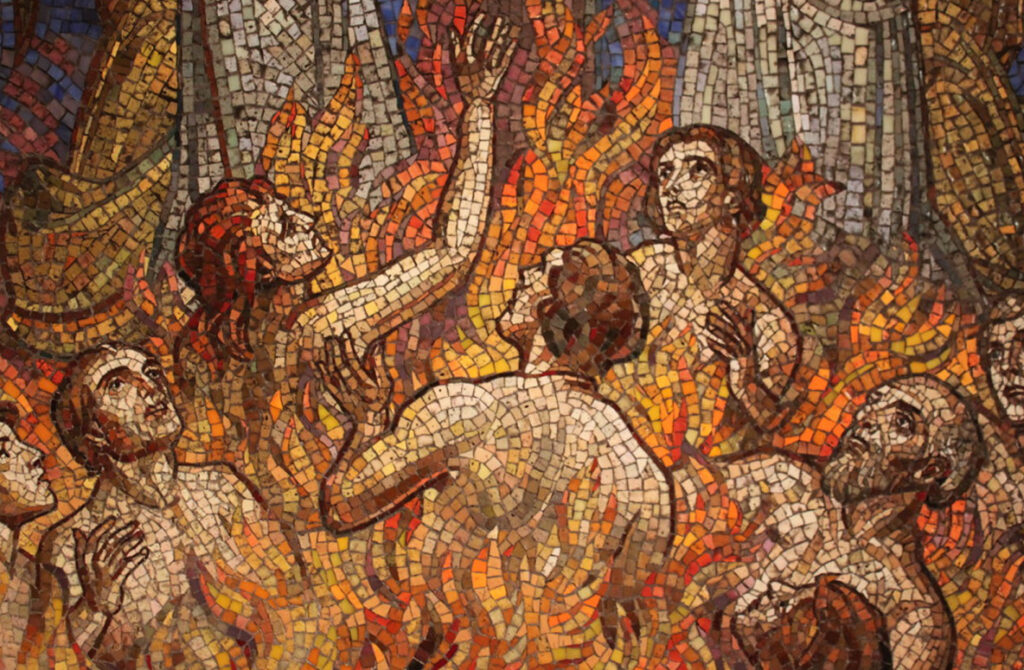 ROME: We believe in eternal life. We believe that the souls of all those who die in the grace of Christ – whether they must still make expiation in the fire of Purgatory, etc., etc. (Companion to Catechism, Paul VI, The Credo of the People of God 28, p.401, see p.404-407)
ROME: We believe in eternal life. We believe that the souls of all those who die in the grace of Christ – whether they must still make expiation in the fire of Purgatory, etc., etc. (Companion to Catechism, Paul VI, The Credo of the People of God 28, p.401, see p.404-407)
The refutation of merit. The treasury of merit is a so-called depository of the extra good works of Jesus, Mary, and the Saints that can be dispensed to those that need more good works, more righteousness in order to expiate their sins to be freed from purgatory and then to arrive at heaven.
Related to these ideas are the Roman Catholic doctrines of:
1) supererogation: performing more than the moral law requires and thus the “excess” good works are deposited in the treasury of merit.
2) And condign merit: man’s cooperating with God’s grace enabling man to merit part of his standing before God.
Hence, one of the ways to receive from the treasury of merit was through the purchase of an indulgence. Of course, this is all tied to the doctrine of salvation and thus to the doctrine of justification.
The return to the Scriptures. God converted Luther while he was working on a commentary on Romans, with this text.
Romans 1:16-17 For I am not ashamed of the gospel, for it is the power of God for salvation to everyone who believes, to the Jew first and also to the Greek. For in it the righteousness of God is revealed from faith to faith; as it is written, “But the righteous man shall live by faith.”
The recapture of the gospel of justification by faith alone. Luther believed that this article, Sola Fide, is what the church stands or falls upon. Justification by Faith Alone. This is the cornerstone of the Gospel of Grace.
Luther and many after him believed that this doctrine was worth living for and worth dying for. I believe the church needs to recapture a belief that the Gospel of free grace in Christ is worth living and worth dying for.
The singular primacy of the scripture. But Sola Fide is actually built upon a more basic doctrine of the Reformation – and that is Sola Scriptura – Scripture alone (as our only guide for religious doctrine and practice).
With our remaining time I want to speak about the Reformation concerning the Scriptures and especially the Scriptures in the common languages.
The denunciation of God’s word in the vernacular – papal sources. Remember, the Protestant Reformation began as a protest movement, men were protesting against certain Roman Catholic doctrines and practices.
The Roman Catholic church historically did not approve of the Scripture in common languages.
The Roman Catholic response. Now the ordinary response from the Roman Catholic here is something like this, the Roman Church was not against translating the Bible into the common languages, they were and are against bad translations of the Bible.
The Reformational examination. Of course, we as Protestants are also against bad translations of the Bible.
But does their claim settle the matter? Were men burned at the stake for bad translations? And had they been better translators would they have been lauded by the Roman church?
It is helpful to study the Council of Trent on the fourth session, and the eighteenth session, and then on the list of prohibited books produced after the council. As an aside, the sixth session is on justification, very informative.
You can read the Council of Trent documents online at counciloftrent.com.
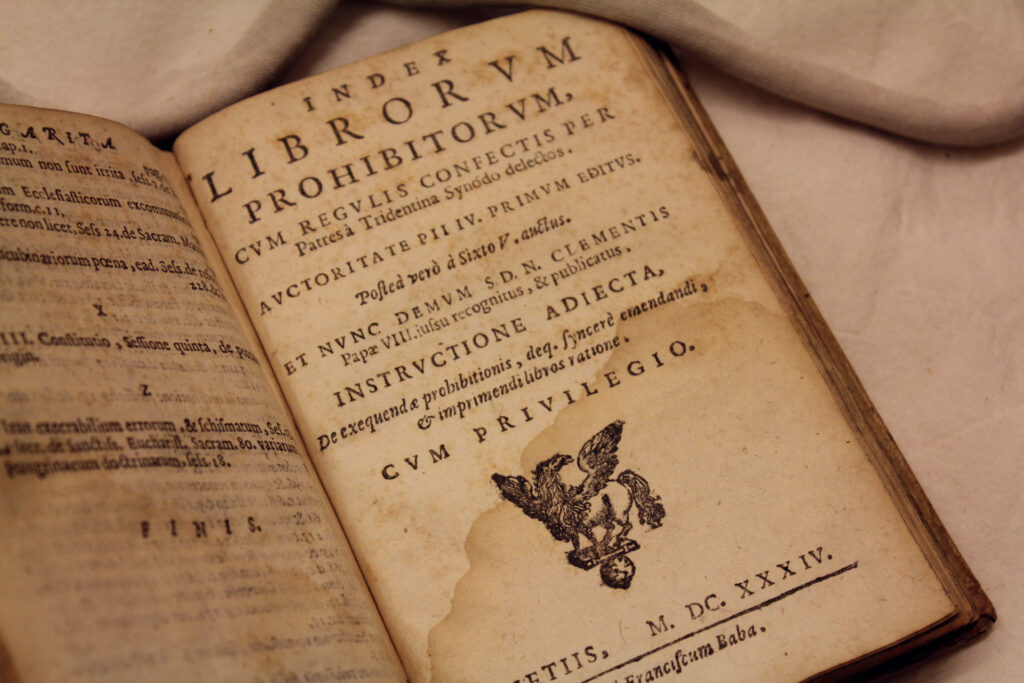 Here is a portion of the index of prohibited books.
Here is a portion of the index of prohibited books.
“The Index of Prohibited Books, Index Librorum Prohibitorum, established in 1557 by Pope Paul IV, (Ten Rules) was a list of books that Catholics were prohibited from reading on pain of excommunication.
I
All books which have been condemned either by the supreme pontiffs or by ecumenical councils before the year 1515 and are not contained in this list, shall be considered condemned in the same manner as they were formerly condemned.
II
The books of those heresiarchs, who after the aforesaid year originated or revived heresies, as well as of those who are or have been the heads or leaders of heretics, as Luther, Zwingli, Calvin, Balthasar Friedberg, Schwenkfeld, and others like these, whatever may be their name, title or nature of their heresy, are absolutely forbidden. The books of other heretics, however, which deal professedly with religion are absolutely condemned.
IV
Since it is clear from experience that if the Sacred Books are permitted everywhere and without discrimination in the vernacular, there will by reason of the boldness of men arise therefrom more harm than good, the matter is in this respect left to the judgment of the bishop or inquisitor, who may with the advice of the pastor or confessor permit the reading of the Sacred Books translated into the vernacular by Catholic authors to those who they know will derive from such reading no harm but rather an increase of faith and piety, which permission they must have in writing. Those, however, who presume to read or possess them without such permission may not receive absolution from their sins till they have handed them over to the ordinary. Bookdealers who sell or in any other way supply Bibles written in the vernacular to anyone who has not this permission, shall lose the price of the books, which is to be applied by the bishop to pious purposes, and in keeping with the nature of the crime they shall be subject to other penalties which are left to the judgment of the same bishop. Regulars who have not the permission of their superiors may not read or purchase them.
VI
Books which deal in the vernacular with the controversies between Catholics and heretics of our time may not be permitted indiscriminately, but the same is to be observed with regard to them what has been decreed concerning Bibles written in the vernacular.
Here is the essence of the argument,
A feigned theoretical permission to translate Scripture into common languages. In theory (kind of) the Roman Church did not expressly forbid translating the Bible into the common languages.
You must receive approval from the Roman hierarchy. But you just first needed approval from the Roman hierarchy in the church, which you were never going to get.
You must not differ doctrinally or practically from the Roman hierarchy. If you concluded any doctrines contrary from the Roman church from the Bible, like justification by faith alone, or against the papacy or for the spiritual presence of Christ in the supper rather than the physical presence then you would not receive approval.
So you see, this is a potential ability to translate into the common language that in practice would not happen.
You must not distribute Scripture in the common language to the laity. Listen to the rules for prohibited books again,
III
The translations of writers, also ecclesiastical, which have till now been edited by condemned authors, are permitted provided they contain nothing contrary to sound doctrine. Translations of the books of the Old Testament may in the judgment of the bishop be permitted to learned and pious men only, provided such translations are used only as elucidations of the Vulgate Edition for the understanding of the Holy Scriptures and not as the sound text. Translations of the New Testament made by authors of the first class of this list shall be permitted to no one, since great danger and little usefulness usually results to readers from their perusal.
We see that at best a Roman priest, or a Roman scholar could read the Old Testament in the vernacular, but no one was allowed to read the New Testament in the vernacular.
 And the stated reason for this is that these men that did translate the New Testament into the common languages were deemed heretics by the Roman hierarchy.
And the stated reason for this is that these men that did translate the New Testament into the common languages were deemed heretics by the Roman hierarchy.
The end result means again, that the possibility for the laity to have the Bible in their own language was a pious farce.
A feigned innocency in the punishment of translators. As a brief aside, another thing that happens is the state or the civil government of the time, itself was under the authority of the Roman Catholic church, could and would make civil laws against translating the Bible into the common languages.
And so, then the Roman church could say, we have not condemned this translator to death, the state has.
For example, at the time of William Tyndale in England we have this,
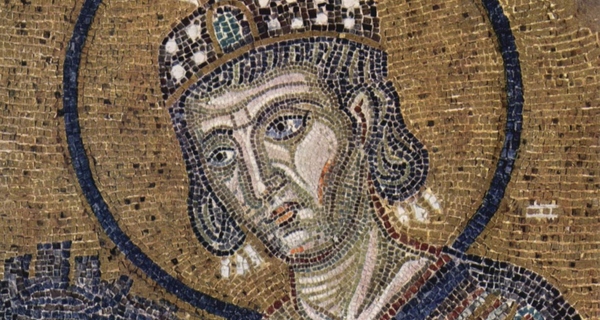
Under the 1408 Constitutions of Oxford,, sometimes known as the Thomas Arundel’s constitutions, it was strictly forbidden to translate the Bible into the native tongue. This ban was vigorously enforced by Cardinal Wolsey and the Lord Chancellor, Sir Thomas More, in an attempt to prevent the rise of English ‘Lutheranism’.
To be fair, Protestant church leaders have sometimes hidden their ecclesiastical malice behind the sword of the state, feigning innocency to bloodshed for real or perceived “heresies”. To my mind this is subterfuge.
But is the modern Romanist’s claim correct that the Roman church really did want the Bible in the common languages? I believe that a Roman so-called pope would rightly represent their view.
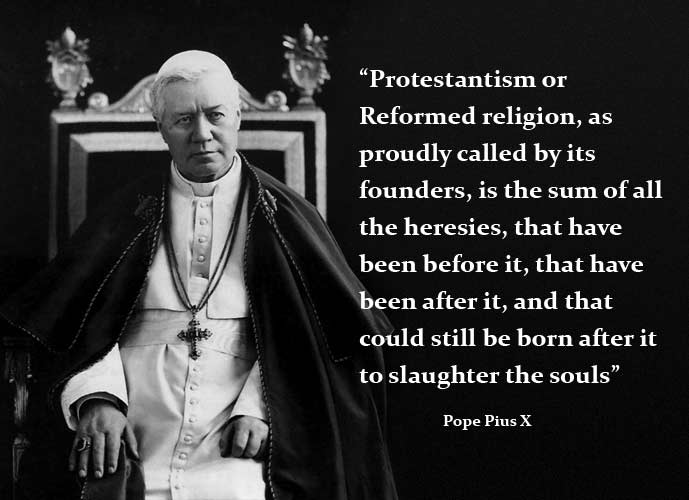 Let me give us some quotes from various (so-called) popes that I have gleaned from a Roman Catholic source. (see virgosacrata.com on vernacular Bible translations, the site means “Holy Virgin”)
Let me give us some quotes from various (so-called) popes that I have gleaned from a Roman Catholic source. (see virgosacrata.com on vernacular Bible translations, the site means “Holy Virgin”)
Pope John XXIII, Veterum Sapientia, 1962 (pope from 1958-1963)
“The Catholic Church has a dignity far surpassing that of every merely human society, for it was founded by Christ the Lord. It is altogether fitting, therefore, that the language it uses should be noble, majestic and non-vernacular.“
A Christian to whom a Bible has been offered by a Protestant or an agent of the Protestants should reject it with disgust, because it is forbidden by the Church. If it was accepted by inadvertence, it must be burnt as soon as possible or handed in to the Parish Priest” (Catechism of Pius X). (1903-1914)
“We were overcome with great and bitter sorrow when We learned that a pernicious plan, by no means the first, had been undertaken, whereby the most sacred books of the Bible are being spread everywhere in every vernacular tongue, with new interpretations which are contrary to the wholesome rules of the Church, and are skillfully turned into a distorted sense. For, from one of the versions of this sort already presented to Us we notice that such a danger exists against the sanctity of purer doctrine, so that the faithful might easily drink a deadly poison from those fountains from which they should drain ‘waters of saving wisdom’ [Ecclus. 15:3]…” (Pope Pius VII, 1816 A.D.)
“For you should have kept before your eyes the warnings which Our predecessors have constantly given, namely, that, if the sacred books are permitted everywhere without discrimination in the vulgar tongue, more damage will arise from this than advantage. Furthermore, the Roman Church, accepting only the Vulgate edition according to the well-known prescription of the Council of Trent, disapproves the versions in other tongues and permits only those which are edited with the explanations carefully chosen from writings of the Fathers and Catholic Doctors, so that so great a treasure may not be exposed to the corruptions of novelties, and so that the Church, spread throughout the world, may be ‘of one tongue and of the same speech’ [Gen. 11:1].” (Pope Pius VII, 1816 A.D.)
“Since in vernacular speech we notice very frequent interchanges, varieties, and changes, surely by an unrestrained license of Biblical versions that changelessness which is proper to the divine testimony would be utterly destroyed, and faith itself would waver, when, especially, from the meaning of one syllable sometimes an understanding about the truth of a dogma is formed. For this purpose, then, the heretics have been accustomed to make their low and base machinations, in order that by the publication of their vernacular Bibles, (of whose strange variety and discrepancy they, nevertheless, accuse one another and wrangle) they may, each one, treacherously insert their own errors wrapped in the more holy apparatus of divine speech. ‘For heresies are not born,’ St. Augustine used to say, ‘except when the true Scriptures are not well understood and when what is not well understood in them is rashly and boldly asserted.’ But, if we grieve that men renowned for piety and wisdom have, by no means rarely, failed in interpreting the Scriptures, what should we not fear if the Scriptures, translated into every vulgar tongue [i.e. the languages of the people] whatsoever, are freely handed on to be read by an inexperienced people who, for the most part, judge not with any skill but with a kind of rashness?…” (Pope Pius VII, 1816 A.D.)
“We must also be wary of those who publish the Bible with new interpretations contrary to the Church’s laws. They skillfully distort the meaning by their own interpretation. They print the Bibles in the vernacular and, absorbing an incredible expense, offer them free even to the uneducated. Furthermore, the Bibles are rarely without perverse little inserts to insure that the reader imbibes their lethal poison instead of the saving water of salvation. Long ago the Apostolic See warned about this serious hazard to the faith and drew up a list of the authors of these pernicious notions. The rules of this Index were published by the Council of Trent; the ordinance required that translations of the Bible into the vernacular not be permitted without the approval of the Apostolic See and further required that they be published with commentaries from the Fathers. The sacred Synod of Trent had decreed in order to restrain impudent characters, that no one, relying on his own prudence in matters of faith and of conduct which concerns Christian doctrine, might twist the sacred Scriptures to his own opinion, or to an opinion contrary to that of the Church or the popes. Though such machinations against the Catholic faith had been assailed long ago by these canonical proscriptions, Our recent predecessors made a special effort to check these spreading evils. With these arms may you too strive to fight the battles of the Lord which endanger the sacred teachings, lest this deadly virus spread in your flock.” (Pope Pius VIII, “Tradition Humilitati “, 1829 A.D.)
The hiding of God’s word. Let me give us a practical application of these anti-vernacular quotes:
sic enim dilexit Deus mundum ut Filium suum unigenitum daret ut omnis qui credit in eum non pereat sed habeat vitam aeternam (John 3:16 Vulgate)
What did I just say to you? Have you been helped? Unless you speak Latin, this is just unhelpful noise, God’s word is kept from us. (I Cor.14:6-12)
The revealing of God’s word. Let me read that same verse of Scripture to you in another language.
John 3:16. For God so loved the world, that He gave His only begotten Son, that whoever believes in Him shall not perish, but have eternal life.
Did you understand? Have you been helped?
The Reformation gave the Bible back to the people. The Protestant Reformation took the Holy Bible away from under the ecclesiastical tyranny of the Roman Catholic leadership and gave the Bible back to whom it belongs – to the people of God.
The Reformation gave us the Bible in the common language. The Reformation gave us the Bible in the common language of the people.
God says through Paul in First Corinthians that His word should be given in a known tongue. (I Cor.14:6-12)
Let me give us four men that help give the world the Bible in the common languages. (Wycliffe, Hus, Luther, and Tyndale)
John Wycliffe (1330-1384). A catholic priest, Wycliffe is known as the morning star of the reformation. He is most well-known because he was the first to translate the Bible into the English language (from the Latin Vulgate). There is some debate whether he translated the Bible on his own or if he had help from other men.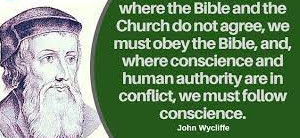
He wrote two books which preceded his translation of the Bible into English, which I would argue prompted him to translate the Bible into English.
He wrote, “On Divine Dominion” (1373-1374) a work in which he questions the authority of the papacy as he can find no warrant for it in Scripture.
ROME. Here let me give you a quote from Roman Catholic Doctrine:
The Roman Pontiff, head of the college of bishops, enjoys this infallibility in virtue of his office, when as supreme pastor and teacher of all the faithful – who confirms his brethren in the faith, he proclaims in an absolute decision a doctrine pertaining to faith or morals. For that reason his definitions are rightly said to be irreformable by their very nature and not by reason of the assent of the church, in as much as they were made with the assistance of the Holy Spirit promised to him in the person of blessed Peter himself; and as a consequence they are in no way in need of the approval of others, and do not admit of appeal to any other tribunal. (Companion to Catechism, Lumen gentium 25, p.27-27)
Then in 1377-1378 Wycliffe wrote, “On the Truth of Holy Scripture” here he argues for the centrality of the Scriptures for the Christian Faith.
And then he translated the Scripture into English circa 1382. You see the progression.
 At the time of his translation according to Roman Catholic Law translating the Bible into a common language, without approval of the Roman Church was a heresy punishable by death.
At the time of his translation according to Roman Catholic Law translating the Bible into a common language, without approval of the Roman Church was a heresy punishable by death.
In 1407 the English translation was denounced as unauthorized, and translating or using translated Bibles was defined as heresy — a crime for which the punishment was death by burning.
And Wycliffe knew this and stated he was so convinced that the Scriptures must be in the language of the people that he was willing to face death. He advocated the RIGHT of the common man to have the Scriptures in his common language. RADICAL reform!
For translating the Bible into English, the pope issued a papal bull against him. This is Wycliffe’s response:
“You say it is heresy to speak of the Holy Scriptures in English. You call me a heretic because I have translated the Bible into the common tongue of the people. Do you know whom you blaspheme? Did not the Holy Ghost give the Word of God at first in the mother-tongue of the nations to whom it was addressed? Why do you speak against the Holy Ghost? You say that the Church of God is in danger from this book. How can that be? Is it not from the Bible only that we learn that God has set up such a society as a Church on the earth? Is it not the Bible that gives all her authority to the Church? Is it not from the Bible that we learn who is the Builder and Sovereign of the Church, what are the laws by which she is to be governed, and the rights and privileges of her members? Without the Bible, what charter has the Church to show for all these? It is you who place the Church in jeopardy by hiding the Divine warrant, the missive royal of her King, for the authority she wields and the faith she enjoins” (Fountain, John Wycliffe, pp. 45-47).
He died on December 30, 1384, of a stroke.
At the Council of Constance (May 4, 1415), the church declared Wycliffe a heretic, and declared that all his works (including the English Bible) be confiscated and burned, and finally that his bones be dug up and burned and his ashes thrown into The River Swift.
Jan Hus (1369-1415) was another pre-reformer – Roman Catholic priest in Bohemia, in modern day Czech Republic.
He was a devout student of the Scriptures. He was also influenced by the writings of John Wycliffe and taking Wycliffe’s lead he began to preach his sermons in the Czech language instead of in Latin at the Bethlehem Chapel in Prague.
Here are some of the things learned from the Bible, which he later taught, for which later he would be executed.
He believed that the Scriptures were the supreme rule for doctrine and for life. And like Wycliffe, he believed all men should have the Bible in their language.
As such he believed the papacy was unscriptural.
I believe he even came to believe and to preach that the papacy was the antichrist.
Also, he came to believe that the Scriptures did not teach the doctrine of transubstantiation. And this is one of the foundational doctrines of Catholicism.
On a lesser degree, but still important, through the Scriptures he began to denounce the sinfulness of the church hierarchy. He found that the Scriptures called Christians to live a holy life.
Jan Hus was commanded by Holy Roman Emperor Sigismund to come to Constance, Germany, and appear before the Council of Constance.
Hus was guaranteed safe passage, but, when he arrived, he was arrested and imprisoned.
At the Council of Constance, July 6, 1415, a mock trial occurred, and, when Hus refused to recant his teachings, he was burned at the stake as a heretic.
It is said that his last words were, “Lord Jesus, I endure this cruel death for you. I ask you to have mercy on my enemies.”
Martin Luther. (1483-1546) Then we have a German influenced by this Czech, Martin Luther.
In 1505 Luther joined the Augustinian Hermits, “black cloister/robes”. Luther’s two-fold vow for the order was poverty and chastity as means unto his salvation.
Like Wycliffe, and like Hus, Luther also believed the people needed and had a right to the Bible in their own language.
One of Luther’s greatest achievements was translating the Scripture into the language of the common man – German.
Here is Martin Luther’s famous response when asked at the Diet of Worms (1522) to recant of his teachings.
Since then Your Majesty and your lordships desire a simple reply, I will answer without horns and without teeth. Unless I am convicted by Scripture and plain reason – I do not accept the authority of popes and councils, for they have contradicted each other – my conscience is captive to the Word of God. I cannot and will not recant anything, for to go against conscience is neither right nor safe. God help me. Amen.
ROME. Here is Roman Doctrine:
In the supremely wise arraignment of God, sacred traditions, sacred scripture, and the Magisterium of the church are so connected and associated that one of them cannot stand without the others.
Again…
The task of giving an authentic interpretation of the word of God whether in its written form or in the form of Tradition, has been entrusted to the living teaching office of the church alone. (Companion to Catechism, Dei Verbum 10, p.380-381)
The Roman Catholic denunciation of the Reformers. An interesting side note. The Jesuit Church of Rome (Chiesa del Gesu, Church of Jesus, Society of Jesus) built during the Roman Catholic counter-reformation during the 16th century has a statue built over the tomb of the founder of the Jesuits – Ignatius Loyola.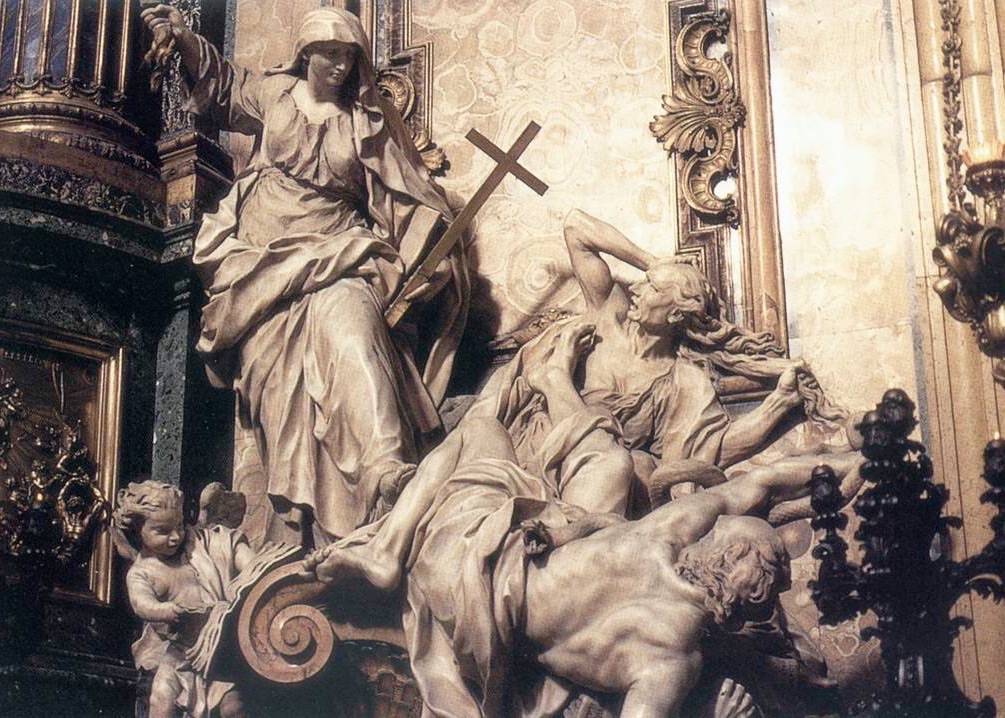
The title of the statue is “Religion Triumphs Over (Or Flagellates) Heresy”.
It depicts the Virgin Mary with a cross in her left hand and a lightning bolt in her right-hand towering over two men cringing at her feet – she is about to cast two heretics into hell – Jan Hus and Martin Luther. (see John 16:1-3)
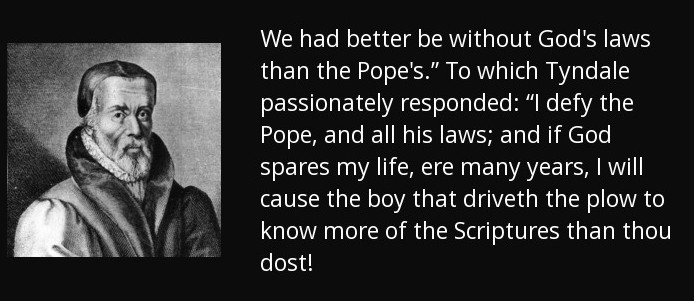 William Tyndale (1490-1536). Cardinal Thomas Wolsey issued a demand on June 18, 1528 for the Ambassador to the Netherlands to track down Tyndale for trial and execution.
William Tyndale (1490-1536). Cardinal Thomas Wolsey issued a demand on June 18, 1528 for the Ambassador to the Netherlands to track down Tyndale for trial and execution.
Secret agents were also sent from England, but he was able to elude his pursuers for eight years in the city of Antwerp before being discovered and seized.
Tyndale was convicted of heresy by special prosecutors of the Holy Roman Emperor various Protestant doctrines and for translating the Bible into English. He was strangled and burned at the stake.
The benefits of having the Scriptures in the common languages.

We have God’s word as our only rule for faith and practice. The Protestant Reformation gave us the Bible in our own language as the supreme authority for faith and practice.
Our confession of faith, which is the Protestant Reformation in England says this,
WCF 1.8 The Old Testament in Hebrew (which was the native language of the people of God of old) , and the New Testament in Greek (which, at the time of the writing of it was most generally known to the nations) , being immediately inspired by God, and, by His singular care and providence, kept pure in all ages, are therefore authentical;(1) so as, in all controversies of religion, the Church is finally to appeal unto them.(2) But, because these original tongues are not known to all the people of God, who have right unto and interest in the Scriptures, and are commanded, in the fear of God, to read and search them,(3) therefore they are to be translated into the vulgar language of every nation unto which they come,(4) that the Word of God dwelling plentifully in all, they may worship Him in an acceptable manner;(5) and, through patience and comfort of the Scriptures, may have hope.(6) (1) Matt. 5:18. (2) Isa. 8:20; Acts 15:15; John 5:39,46. (3) John 5:39. (4) 1 Cor. 14:6,9,11,12,24,27,28. (5) Col. 3:16. (6) Rom. 15:4.
We are freed from the religious commandments of Man. The Protestant reformation by freeing the Bible also freed our consciences from being subject to the commandments and the traditions of men. (WCF 20.1-2)
Jesus Christ says this,
Mark 7: 1. The Pharisees and some of the scribes gathered around Him when they had come from Jerusalem, 2 and had seen that some of His disciples were eating their bread with impure hands, that is, unwashed. 3 (For the Pharisees and all the Jews do not eat unless they carefully wash their hands, thus observing the traditions of the elders; 4 and when they come from the market place, they do not eat unless they cleanse themselves; and there are many other things which they have received in order to observe, such as the washing of cups and pitchers and copper pots.) 5 The Pharisees and the scribes asked Him, “Why do Your disciples not walk according to the tradition of the elders, but eat their bread with impure hands?” 6 And He said to them, “Rightly did Isaiah prophesy of you hypocrites, as it is written: ‘THIS PEOPLE HONORS ME WITH THEIR LIPS, BUT THEIR HEART IS FAR AWAY FROM ME. 7 ‘BUT IN VAIN DO THEY WORSHIP ME, TEACHING AS DOCTRINES THE PRECEPTS OF MEN.’ 8 “Neglecting the commandment of God, you hold to the tradition of men.” 9 He was also saying to them, “You are experts at setting aside the commandment of God in order to keep your tradition. 10 “For Moses said, ‘HONOR YOUR FATHER AND YOUR MOTHER’; and, ‘HE WHO SPEAKS EVIL OF FATHER OR MOTHER, IS TO BE PUT TO DEATH’; 11 but you say, ‘If a man says to his father or his mother, whatever I have that would help you is Corban (that is to say, given to God),’ 12 you no longer permit him to do anything for his father or his mother; 13 thus invalidating the word of God by your tradition which you have handed down; and you do many things such as that.”
We affirm the usefulness of Scriptural religious traditions. As an aside, Sola Scriptura does not mean that we hold all religious traditions in contempt.
What it does mean is that we evaluate or judge all religious traditions by the rule of Scripture.
When this does not occur we have the sin and the problem that Christ spoke about in Mark chapter seven. One rule WILL become supreme. Either the word of God, with the commands of God. Or, the word of man with the traditions of man.
Beloved, may we daily live upon the word of God that we now have in our own languages, all thanks to God and His working through His servants.
Amen


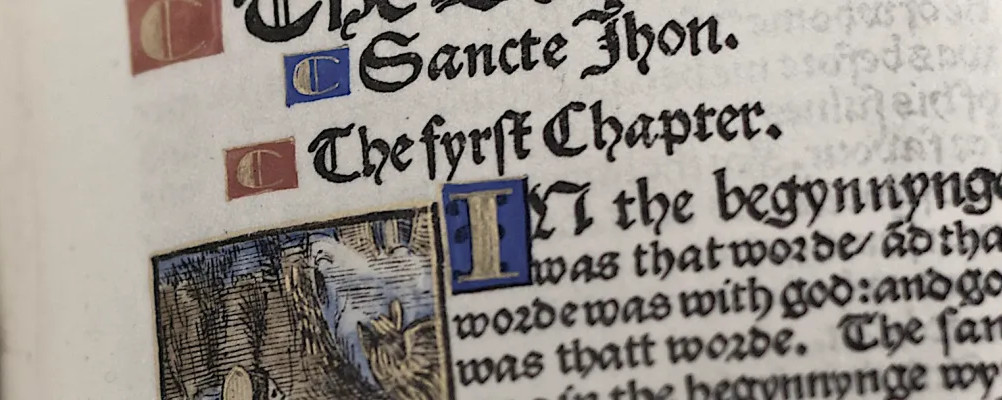
Comments are closed